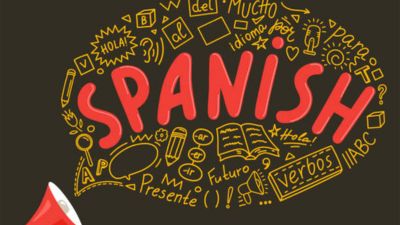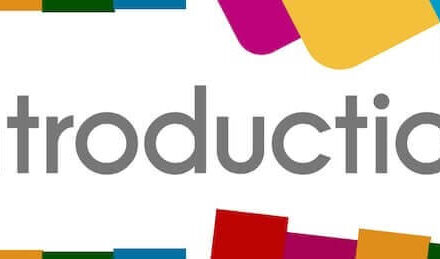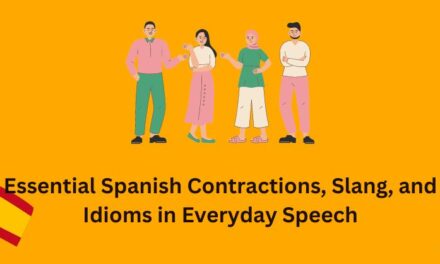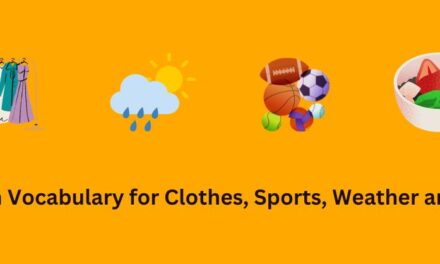Must-Know Spanish Contractions, Slang, and Idioms
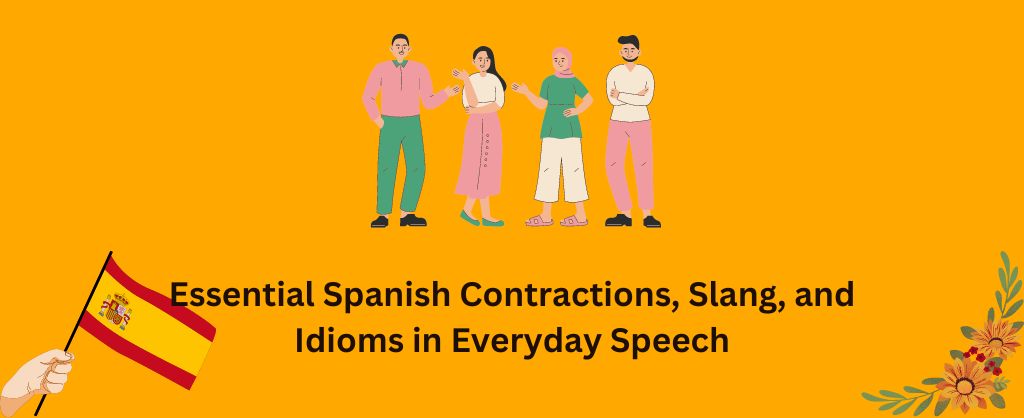
Spanish is spoken by hundreds of millions of people around the world, from Spain to Latin America. Like any language, Spanish has evolved overtime to include contractions, slang, and idioms that make speech more efficient and expressive.
Content
- Spanish Contractions
- Common Spanish Slang
- Greetings and Goodbyes
- Interjections
- Terms of Endearment
- Spanish Filler Words and Phrases
- Local Spanish Slang
- Common Idiomatic Expressions
- Conclusion
Speaking Spanish in a natural, conversational way means picking up the casual forms, slang, and colloquialisms used every day by native speakers.
This guide covers Spanish contractions, popular slang words, and informal phrases to help you sound more native-like.
Spanish Contractions
Contractions are a short way to say certain words or phrases. Spanish has several one-word and multiple-word contractions that are widely used in informal speech.
One-Word Contractions
Some one-word contractions in Spanish include:
- Al – a + el
- Del – de + el
- Pal – para + el
For example:
- Voy al cine – I’m going to the movies
- Es de del vecino – It’s the neighbor’s
- Estoy listo pal examen – I’m ready for the exam
Multiple-Word Contractions
Multiple words can also be contracted in Spanish speech, such as:
- Pa – para
- Po – poco
- Too/Tuyo – tuyo
- Na – nada
- Verdá – verdad
- Tamién – también
For example:
- Pa cuando vuelvas – For when you come back
- Sólo me queda po dinero – I only have a little money left
- Este libro es too/tuyo – This book is yours
- No tengo na que hacer – I have nothing to do
- Dí la verdá – Tell the truth
- Yo tamién fui – I went too
Common Spanish Slang
In addition to contractions, Spanish includes many slang words and phrases. These are very informal words that are commonly used in speech but rarely found in writing.
Greetings and Goodbyes
Casual greetings and goodbyes in Spanish slang include:
- ¿Qué lo qué? – What’s up?
- ¿Qué onda? – What’s up? (Literally “what wave”)
- ¿Qué hay de nuevo? – What’s new?
- ¿Qué tal? – How’s it going?
- ¡Chao! – Bye! (From the Italian “ciao”)
- ¡Adiós! – Bye!
- ¡Nos vemos! – See you later!
For example:
- ¿Qué onda? ¿Cómo te va con el nuevo trabajo? – What’s up? How’s the new job going?
- ¿Qué tal? Me enteré que te vas de viaje – How’s it going? I heard you’re going on a trip.
- ¡Chao! Te hablo cuando vuelva. – Bye! I’ll call you when I get back.
Interjections
Spanish slang interjections are exclamations used to express emotions. Some examples are:
- ¡Guau! – Wow!
- ¡Uy! – Oops!
- ¡Ándale! – Come on! / Let’s go!
- ¡Órale! – Right on! / Awesome!
For example:
- ¡Guau! No puedo creer que ya seas doctor. – Wow! I can’t believe you’re already a doctor.
- Se me olvidó la tarea, ¡uy! – I forgot my homework, oops!
- ¡Ándale! Vamos a llegar tarde al concierto. – Come on! We’re going to be late for the concert.
- ¡Órale! ¡Ganamos el partido! – Awesome! We won the game!
Terms of Endearment
It’s very common in Spanish to use terms of endearment when addressing loved ones. Some slang words of affection include:
- Mi amor – My love
- Corazón – Sweetheart
- Cielo – Honey / Sweetie
- Lindo/Linda – Cute / Sweetie pie
- Bebé – Baby
- Rey/Reina – King/Queen
For example:
- Mi amor, ¿me pasas la sal? – My love, can you pass the salt?
- No llores, corazón – Don’t cry, sweetheart
- Cielo, se nos hace tarde – Sweetie, we’re running late
- Eres muy lindo, gracias por ayudarme – You’re so sweet for helping me.
- Bebé, ¿quieres ir al cine? – Baby, do you want to go to the movies?
- Eres mi reina – You’re my queen
Spanish Filler Words and Phrases
Native speakers use “filler words” when chatting to fill space as they think. Here are common Spanish filler words and phrases:
- Eeehhh – Ummm
- Esteee – Ummm
- Pueesss – Well
- Osea – Like
- Bueno – Well
- ¿Me explico? – You know what I mean?
- ¿Qué te digo? – What can I tell you?
- Y todo eso – And all that
These filler words and phrases help conversations flow naturally and sound unscripted. Work on sprinkling them into your casual speech.
Local Spanish Slang
In addition to the widespread slang above, Spanish develops unique local slang words and phrases in different countries and regions.
Mexico
Mexican Spanish is full of colorful casual expressions. Some examples are:
- ¿Qué pedo? – What’s up? (Literally “what fart”)
- No manches – No way (From “don’t stain”)
- Chido – Cool
- Padre – Cool (Literally “father”)
- Güey/Wey – Dude
- Chambear – To work
For example:
- ¿Qué pedo? ¿Viste el partido de futbol? – What’s up? Did you see the soccer game?
- ¡No manches! ¿Mañana es tu cumpleaños? – No way! Tomorrow is your birthday?
- Ese concierto estuvo muy chido – That concert was very cool
- Tu nueva novia es muy padre – Your new girlfriend is very cool
- ¿Que onda güey? – What’s up dude?
- Tengo que chambear todo el día – I have to work all day
Spain
Spanish slang from Spain includes:
- Tío/Tía – Dude / Mate
- Venga – Come on
- Colega – Friend
- Guay – Cool
- Mola (molar) – To be cool
- Chungo – Bad/Tough
For example:
- Tío, esa camisa es muy guay – Dude, that shirt is very cool
- Venga, vamos a la playa – Come on, let’s go to the beach
- Oye colega, ¿quieres tomar algo? – Hey friend, want to grab a drink?
- Ese examen estuvo chungo – That exam was tough
- Me mola tu nuevo corte de pelo – I like your new haircut
Argentina
Popular slang from Argentina includes:
- Che – Hey / Dude
- Dale – Come on
- Copado – Cool
- Piola – Cool / Awesome
- ¡Qué bárbaro! – Wow! / Awesome!
For example:
- Che, ¿vamos al cine? – Hey, should we go to the movies?
- Dale, no seas aburrido – Come on, don’t be boring
- Ese disco está copado – That album is cool
- Tu hermano es re piola – Your brother is so awesome
- ¡Qué bárbaro! Aprobé el examen – Wow! I passed the test
Colombia
- Parcero – Friend
- Chévere – Great
- Bacano – Cool
- De una – For sure
Chile
- Bakán – Cool
- Cachai? – You get it?
- Pololo/polola – Boyfriend/girlfriend
- Al tiro – Right away
Peru
- Pata – Friend
- Chevere – Great
- Huevón – Lazy dude
- Ya – Right!
Puerto Rico
- Boricua – Puerto Rican person
- ¡Ahora mismo! – Right now!
- Pana – Friend
- ¡Dale! – Let’s go! / Come on!
Common Idiomatic Expressions
Idioms are expressions that have a figurative meaning different from the literal words. Spanish has many colorful idioms used in everyday speech:
Ser pan comido
- Literal: To be bread eaten
- Meaning: To be a piece of cake / super easy
Este trabajo será pan comido para ti – This job will be a piece of cake for you
Costar un ojo de la cara
- Literal: To cost an eye of the face
- Meaning: To be very expensive
Ese restaurante cuesta un ojo de la cara – That restaurant is really expensive
Llover a cántaros
- Literal: To rain in water pitchers
- Meaning: To rain heavily
Está lloviendo a cántaros – It’s raining cats and dogs
Hablar por los codos
- Literal: To talk through the elbows
- Meaning: To talk a lot / talk someone’s ear off
Ella habla por los codos y no se calla nunca – She talks someone’s ear off and never shuts up
Dar el brazo a torcer
- Literal: To give your arm to twist
- Meaning: To give up / change your mind
Después de discutir tanto, finalmente dio el brazo a torcer – After arguing so much, he finally gave up
Here are some more common Spanish idioms and colloquialisms:
- Me importa un bledo – I don’t care at all
- Me trae sin cuidado – It doesn’t worry me
- Estar en la luna – To be distracted
- Estar en las nubes – To daydream
- No tener pelos en la lengua – To be blunt
- A lo hecho, pecho – No use crying over spilt milk
- El mundo es un pañuelo – It’s a small world
- De tal palo, tal astilla – The apple doesn’t fall far from the tree
- Dar el brazo a torcer – To give up
- Irse por las ramas – To go off topic
- Estar en la gloria – To be very happy
- Quedarse con la boca abierta – To be shocked
- Tomar el pelo – To tease jokingly
- Estar hasta la coronilla – To be fed up
- No tener ni pies ni cabeza – To make no sense
- Ir a toda pastilla – To go fast
Conclusion
- Spanish contractions, slang, and idioms allow speakers to communicate casually and colorfully.
- One-word contractions like al, del, and pal shorten phrases.
- Multiple-word contractions like pa, po, and na efficiently replace longer words.
- Slang interjections like ¡Guau! and ¡Órale! express reactions.
- Terms of endearment like mi amor and lindo affectionately address loved ones.
- Local slang gives Spanish regional personality, like chido in Mexico or tío in Spain.
- Idioms like ser pan comido and hablar por los codos add figurative flair.
- Learning informal Spanish speech patterns allows you to converse naturally with native speakers.
- Focus on the most widely-used contractions, slang, and idioms to start sounding casually conversational in Spanish.
In summary, contractions, slang, and idioms are an essential part of everyday casual Spanish. Mastering these common speech patterns will help you have more natural and expressive conversations.


